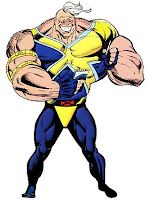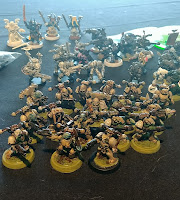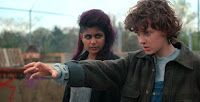Anyway, I’m a bit short on time—the past few weeks have been a bit crazy for me—but I still wanted to get something up here. And I realized there was a topic I hadn’t talked about in a while. Not in any detail, anyway…
 Personally, I think an obstacle’s slightly different from a conflict. It’s just terminology, yeah, but exterior problems tend to be called obstacles, while interior ones are almost always labeled as conflicts. Captain Marvel wants to save Earth from an alien invasion (obstacle), but first she needs to come to terms with the fact that her adoptive alien race, the Kree, may have been lying to her for years about a lot of stuff (conflict). See what I mean?
Personally, I think an obstacle’s slightly different from a conflict. It’s just terminology, yeah, but exterior problems tend to be called obstacles, while interior ones are almost always labeled as conflicts. Captain Marvel wants to save Earth from an alien invasion (obstacle), but first she needs to come to terms with the fact that her adoptive alien race, the Kree, may have been lying to her for years about a lot of stuff (conflict). See what I mean?First Thought– I must have a challenge
Second Thought–My characters need a reason to confront said challenge.
 If my characters are going to take on a challenge, they need a reason to do it. If I’ve spent the past four days walking through the desert, getting that drink is probably a life-or-death thing for me. Captain Marvel isn’t pursuing the Skrulls as a part time hobby—it’s her sworn duty as an officer of the Kree military. I need to make sure this reason is really there. It might be clear in my head why the characters are going to undertake a challenge, but is it clear on the page? This is doubly true for internal things, which can be a lot more subtle depending on what point of view I’m using
If my characters are going to take on a challenge, they need a reason to do it. If I’ve spent the past four days walking through the desert, getting that drink is probably a life-or-death thing for me. Captain Marvel isn’t pursuing the Skrulls as a part time hobby—it’s her sworn duty as an officer of the Kree military. I need to make sure this reason is really there. It might be clear in my head why the characters are going to undertake a challenge, but is it clear on the page? This is doubly true for internal things, which can be a lot more subtle depending on what point of view I’m usingThird Thought—My challenge needs a reason to exist.
.
Fourth Thought—My challenge needs to be daunting.
 Not only am I weak from dehydration and facing ten armed guards around the oasis, the actual spring itself is booby-trapped. Someone centuries ago built all sorts of pressure plates around the thing and I’m not exactly in the best condition right now to be tip-toeing and balancing through this spike-launching mine field. Plus, if Captain Marvel can’t find the Skrull agents on Earth, they could establish a foothold here, rebuild their strength, and endanger peace throughout much of the galaxy.
Not only am I weak from dehydration and facing ten armed guards around the oasis, the actual spring itself is booby-trapped. Someone centuries ago built all sorts of pressure plates around the thing and I’m not exactly in the best condition right now to be tip-toeing and balancing through this spike-launching mine field. Plus, if Captain Marvel can’t find the Skrull agents on Earth, they could establish a foothold here, rebuild their strength, and endanger peace throughout much of the galaxy.
This may be a weird way to look at it, but challenges are things we needto deal with, but we don’t want to deal with. My characters don’t want to deal with this because they don’t even want to be in this situation. I think we can all agree things would be a lot easier if that challenge wasn’t even there.
But it is there, so… goddammit…
Fifth Thought—My challenge can’t be impossible.
If you’ve ever watched a horror movie where the killer is merciless,unstoppable, and inescapable… well, that gets pretty dull after the second or third kill, doesn’t it? One of the reasons Jason Voorhees was scary is that he never ran. He just sort of… marched? Lumbered? It always felt like somebody could get away from Jason if they could just go a littlefaster. If it feels like there’s no chance, it’s not interesting. We already know the outcome.
The second issue is when I have challenges that seem impossible to my characters, but have painfully obvious solutions to my readers. We just don’t like these characters, by nature of their stupidity, and that’s not going to win me any points.
This was supposed to be a quick rehash of an old topic, but I keep finding things I want to add to this. I’ve got editing to do, dammit!
If my heroes are so prepared, so trained and equipped that they’re completely ready for this challenge… well, there isn’t really a challenge, is there? If they’ve covered all the angles, researched every possibility, how can they lose? And if they can’t lose… well, that’s kinda boring, isn’t it? We know the outcome again.
 A standard part of so many stories—including Captain Marvel— is when something changes or goes wrong. The one thing we didn’t prepare for happens. We learned something new that completely flips our goals and understanding of the situation. One way or another, the plan’s shattered into a million pieces. I beat the guards and made it past the booby traps and WHAT? There are albino crocodiles in the oasis? Wait, are these guys actually poachers?
A standard part of so many stories—including Captain Marvel— is when something changes or goes wrong. The one thing we didn’t prepare for happens. We learned something new that completely flips our goals and understanding of the situation. One way or another, the plan’s shattered into a million pieces. I beat the guards and made it past the booby traps and WHAT? There are albino crocodiles in the oasis? Wait, are these guys actually poachers?
But think about it—when this happens in a story, it’s almost always the moment we love. It’s when my characters get to look good and show how smart or clever or tough they really are.
And they will judge me on it.
Those are my way-too-many thoughts on challenges. Maybe take some time and look at the challenges your own characters are facing. Are there any? Are they challenging enough? Does your character have a desire to avoid them and a need to face them?
Next time, speaking of challenges, I’m going to do something I’ve tried really hard to avoid here for years. I’m going to go negative.
Until then… go write.











